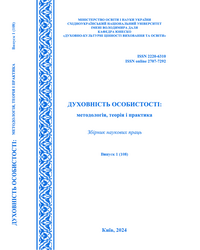FORMATION OF ETHICAL AND LEGAL CULTURE OF FUTURE PSYCHOLOGISTS: THEORETICAL ASPECT
DOI:
https://doi.org/10.33216/2220-6310/2024-109-2-221-234Keywords:
professional training, future psychologist, ethical and legal culture, morality, ethics, law, moral code of a psychologistAbstract
The article reveals the theoretical aspects of the formation of ethical and legal culture of future psychologists
It is noted that the modern period of development of society is characterized by an increase in social tension, a significant aggravation of socio-economic contradictions, which leads to a clash of various systems of moral values, moral assessments of the commission of illegal acts, which leads to psychological and pedagogical problems arising in the system of education and upbringing and actualizes the search for ways to improve the effectiveness of spiritual, moral and legal education of the younger generation, ensuring their mental well-being based on the traditions of domestic and foreign theory and practice.
Based on the integration of law, ethics and morality, the ethical and legal culture of future psychologists is defined as an integrated quality of personality, characterized by a formed system of ethical and legal and professional knowledge, developed moral and legal consciousness and orientation towards the value of morality and law in professional activity, compliance with professional activity, manifested in such qualities of a psychologist as empathy, tolerance, activity and desire for professional self-development based on moral and legal guidelines based on self-reflection of the legality of ethical and legal behavior in psychological interaction in professional activity.It is concluded that the ethical and legal culture of the future psychologist is a systemic formation, each component of which is interconnected with others and at the same time is an independent characteristic that performs its functions. The criteria for the ethical and legal culture of a future psychologist are: knowledge of the legal, moral and essential features of the future psychologist’s activities; awareness of the relationship between one’s capabilities and professional requirements for a psychologist, his moral principles; value-semantic awareness of the content of a psychologist’s professional activity and his personal acceptance of moral choice; implementation of personal self-regulation in accordance with the value and semantic content of the professional activity of the future psychologist according to the ethical code of psychologists.

